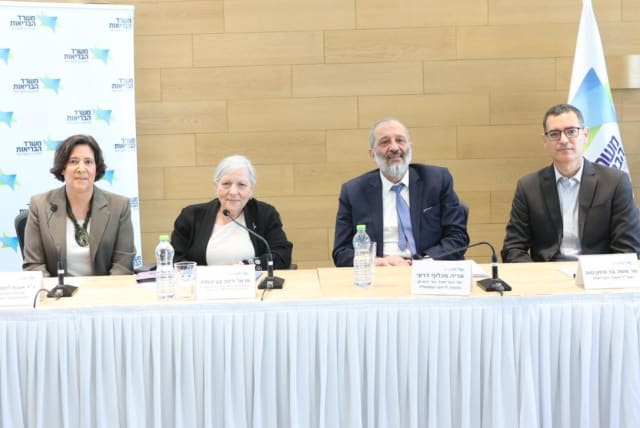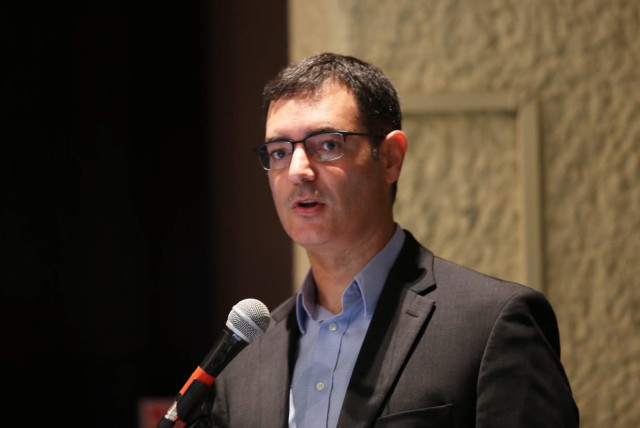Internist doctors blast Health Ministry ‘neglect, failure to keep promises’

“In the next five years, dozens of internal medicine department managers are expected to retire – about 40% of them – and the problem is that only a few are ready to replace them,” they
The heads of the Israel Society of Internal Medicine have sent a strong letter to Health Ministry Director-General Moshe Bar Siman Tov, charging him with failure to meet his obligations to improve the situation in the hospital’s internal medicine departments.
Copies were sent to the health minister, the chairman of the Knesset Health Committee, the chairman of the Knesset State Control Committee, and other authorities in the health system.
It was signed by the heads of the union (chairman Prof. Avishai Ellis, secretary Dr. Hefzi Green, and treasurer Prof. Howard Amital. No public comment was issued by the Health Ministry spokeswoman.
The contents of the signed letter
“The internal medicine wards in Israel are facing a complex challenge these days. On the one hand, there are the difficult consequences of the war in Gaza that have resulted in increasing injuries and wounds, and winter diseases that have raised occupancy rates in the wards even to 120% or beyond,” they wrote. “In addition, it’s increasingly more difficult to cope with chronic shortages of manpower – nurses, doctors, and others and the severe attrition in staffers.”
There are 108 internal medicine departments around the country where patients with the most complex conditions, including the elderly, are treated.
“In the next five years, dozens of internal medicine department managers are expected to retire – about 40% of them – and the problem is that only a few are ready to replace them,” they stated in their letter to Bar Siman Tov.
“The ongoing erosion of the status of the internal medicine departments and the type of daily work, under pressures and burdens, harms not only the quality of medical care for Israelis but also the quality of the training of future doctors,” they continued.
Anger directed at the Health Ministry
The association is angry at the Health Ministry heads even though the departments were promised NIS 290 million in the 2021 budget over three years, but “it did not bother to ensure that the funds reached the departments.
The money was given to hospital managers for other purposes and not to the internal medicine departments. In this negligent conduct, NIS 290 million went down the drain instead of being an example and a model for the success of a process joining the internists, the hospital management, and the Health and Finance Ministries.
They also accused in the letter that “we wish to alert you to the fact that the Health Ministry has published over the years several circulars and instructions that are violated every day.”
Among them was the director-general’s circular from 2020 to prohibit the hospitalization of patients in corridors. This, said the internal medicine specialists, “has never been implemented, and nothing has changed. In many hospitals throughout the country, patients are hospitalized in corridors in the internal wards, even today.”
Also ignored was Bar Siman Tov’s letter in December 2021 that 200 job slots for doctors and 575 for nurses would be added to hospitals' internal medicine departments. Also unimplemented was his letter in 2022 promising the allocation of at least 1.5 positions per internal department – standards that were never reached and were not staffed.
The lack of para-medical professions is evident every day in the departments and harms the ability to provide optimal response and treatment for patients, they charged.
“In addition to this and in contrast to previous years, this year there was no publication of a circular on the preparation of the health system for winter that allocates resources to the hospitals to deal with the burdens following the winter diseases – additional resources that are required in a significant part of the internal departments today.”
“The recommendations of the Tur-Kaspa Committee published in 2019 “that had been meant to guide the ministry’s policy in strengthening the internal medicine departments are far from being implemented, and it seems that the ministry’s policy is moving away from its intention to strengthen the internal hospitalization system for the benefit of all Israeli citizens,” the doctors charged.
“We call on the ministry to implement its recommendations and commitments and make sure that all the adapted resources reach the internal departments to improve patient care,” they concluded.
Jerusalem Post Store
`; document.getElementById("linkPremium").innerHTML = cont; var divWithLink = document.getElementById("premium-link"); if (divWithLink !== null && divWithLink !== 'undefined') { divWithLink.style.border = "solid 1px #cb0f3e"; divWithLink.style.textAlign = "center"; divWithLink.style.marginBottom = "15px"; divWithLink.style.marginTop = "15px"; divWithLink.style.width = "100%"; divWithLink.style.backgroundColor = "#122952"; divWithLink.style.color = "#ffffff"; divWithLink.style.lineHeight = "1.5"; } } (function (v, i) { });

